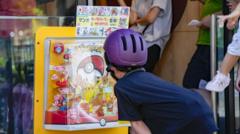Why Did McDonald's Japan Delay Its Toy Promotion Amid Pokémon Complaints?

McDonald's Japan has postponed its upcoming children's menu toy promotion following backlash over a recent Pokémon giveaway that caused significant food wastage and complaints of bulk-buying for resale. This decision is part of the fast-food chain's efforts to reassess its promotional strategies and reduce food waste.
Last updated: 15 October 2023 (BST)
Key Takeaways
- McDonald's Japan postponed its "One Piece" toy promotion due to concerns over food wastage.
- The Pokémon card giveaway led to long queues and bulk-buying, resulting in discarded food.
- Complaints emerged about resellers profiting from limited-edition cards.
- McDonald's plans to cap the number of Happy Set meals customers can purchase.
- The company aims to improve its sales strategy as advised by the Consumer Affairs Agency.
Background of the Pokémon Promotion
In early October, McDonald's Japan introduced a limited-time promotion where customers received Pokémon cards with their "Happy Set" meals, which are aimed at children. This promotion quickly garnered massive popularity, leading to exceedingly long queues at various outlets. However, the excitement soon turned into chaos, with reports of food being discarded as customers prioritised obtaining the cards.
Photographs circulated on social media showed bags of uneaten food left on the streets, highlighting the extent of the issue. The promotion was intended to last three days but ended prematurely at many locations due to the rapid depletion of the cards on the first day. This incident raised serious questions about the impact of promotional events on consumer behaviour and environmental sustainability.
The Decision to Postpone
In light of the backlash, McDonald's Japan announced the postponement of its planned "One Piece" promotion, which was set to launch on 29 August. The fast-food chain stated that the decision was part of a broader review of its Happy Set-related initiatives. Instead of the new toys, customers will receive previously used toys from past Happy Set promotions.
This move aims to address the concerns surrounding food wastage and the overwhelming demand for collectible items that have led to unsustainable purchasing behaviours. In a statement, McDonald's Japan acknowledged the need to reassess its promotional strategies to prevent similar situations from occurring in the future.
The Role of the Consumer Affairs Agency
Japan's Consumer Affairs Agency has played a crucial role in prompting McDonald's to improve its sales strategies. Following the Pokémon promotion debacle, the agency advised the fast-food giant to take concrete steps to mitigate food wastage and ensure responsible marketing practices. The agency's involvement underscores the growing focus on corporate responsibility and sustainability in Japan.
As part of its response, McDonald's Japan has committed to implementing measures that will better manage promotional events. This includes capping the number of Happy Set meals that can be purchased by a single customer to discourage bulk-buying and reselling. These changes are intended to create a fairer and more sustainable promotional environment for all customers.
Understanding the Popularity of Pokémon and One Piece
Pokémon and One Piece are two of the most beloved franchises in Japan, with extensive fan bases that span generations. Pokémon, created in 1996, has evolved into a global phenomenon, with merchandise ranging from video games to trading cards. The recent promotional giveaway of Pokémon cards tapped into this nostalgia and excitement, leading to overwhelming demand.
One Piece, which debuted in 1997, is a long-running manga and anime series that follows the adventures of Monkey D. Luffy and his crew of pirates as they search for the ultimate treasure known as "One Piece." The series has inspired numerous adaptations, including video games and merchandise, making it a suitable candidate for collaboration with McDonald's.
The Resale Market for Collectibles
The resale market for Pokémon cards has been booming, particularly during the pandemic, as collectors sought to invest in rare cards. Some Pokémon cards have sold for astronomical prices, with certain rare editions fetching tens of thousands of pounds. For instance, one card featuring Pikachu was listed for over £25,000 on an online auction site.
This lucrative market has attracted not only children but also adult collectors, leading to behaviours such as bulk-buying during promotions. Resellers often capitalise on limited-edition releases, creating a competitive atmosphere that can compromise the experience for genuine fans and families seeking to enjoy the promotional offerings.
Previous Challenges with Promotions
McDonald's Japan has faced similar challenges in the past with other promotional campaigns. A collaboration with the "Chiikawa" manga series also attracted criticism for encouraging reselling behaviours. These incidents have prompted the company to reconsider its promotional strategies to better align with consumer expectations and social responsibility.
By postponing the One Piece promotion, McDonald's Japan aims to send a clear message about its commitment to sustainability and responsible marketing. The company is actively working to create a balance between engaging promotions and ethical business practices.
Future Directions for McDonald's Japan
As McDonald's Japan reevaluates its promotional strategies, the fast-food chain is expected to explore new ways to engage customers without compromising food sustainability. This could involve introducing more sustainable toys, creating digital incentives, or focusing on promoting healthier meal options for children.
Moreover, the company may consider involving customers in the promotional process, perhaps by allowing them to vote on themes or toys. Engaging consumers in this manner can foster a sense of community and loyalty, helping McDonald's Japan to rebuild its brand image following the recent controversies.
Conclusion: A Call for Sustainable Practices
The recent issues surrounding McDonald's Japan's promotional campaigns highlight the need for greater awareness regarding food wastage and the ethics of reselling collectible items. As companies navigate the complexities of consumer behaviour and environmental impact, it is crucial for them to prioritise sustainable practices that benefit both the business and the community.
As McDonald's Japan moves forward with its commitment to improving its promotional strategies, it will be interesting to see how the fast-food giant adapts to the evolving landscape of consumer expectations. Will they succeed in striking the right balance between exciting promotions and responsible marketing? Only time will tell. #McDonaldsJapan #Sustainability #PromotionalCampaigns
FAQs
Why did McDonald's Japan postpone the One Piece promotion?
McDonald's Japan postponed the One Piece promotion due to complaints about food wastage and bulk-buying during the previous Pokémon giveaway, prompting a review of its promotional strategies.
What issues arose from the Pokémon card giveaway?
The Pokémon card giveaway led to long queues, food wastage, and complaints of bulk-buying for resale, with some food being discarded as customers focused on obtaining the cards.
What steps is McDonald's Japan taking to improve its promotions?
The company is implementing caps on the number of Happy Set meals that can be purchased and revisiting its sales strategies to reduce food wastage and address customer concerns.
What are the popular franchises involved in McDonald's promotions?
McDonald's Japan frequently collaborates with popular franchises such as Pokémon and One Piece, both of which have large fan bases and extensive merchandise.
How have collectible card resales impacted promotions?
The booming resale market for collectible cards has led to bulk-buying behaviours during promotions, resulting in challenges for companies in managing customer experiences and sustainability.
Published: 2025-08-21 16:00:56 | Category: world



